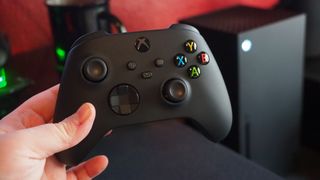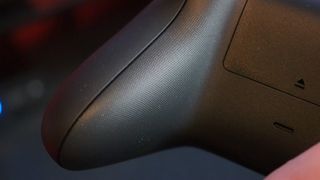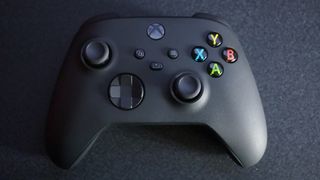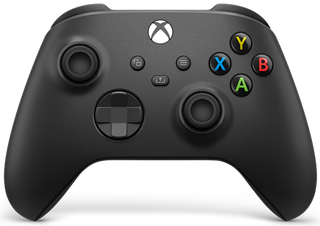Xbox Series X controller first impressions: Building on perfection
How do you build on perfection? That's ultimately what Microsoft's Xbox controller engineering team had to answer.

For many, the Xbox One controller is arguably the best gamepad ever made. It's widely regarded as the industry standard controller for PC gaming, and the offset joysticks have become a mainstay of competing controllers, from third-party controllers like the Razer Wolverine controller to Amazon's shiny new Luna controller. If the Xbox One controller is so good, then how exactly do you build on that?
Rather than gun for battery-draining gimmicks, Microsoft opted to stick with the vast majority of the existing Xbox controller's features for the Xbox Series X and Xbox Series S refresh, bringing in some much-desired traits from competitors, while refining areas of weakness found on the previous-gen gamepad. Here are our early hands-on impressions with the shiny new Xbox Series X and Series S controller.
Xbox Series X/S
Main
- Xbox Series X: Everything we know
- Best games coming to Xbox Series X/S
- List of Xbox Series X specs
- What is the Xbox Series X release date?
- How much does Xbox Series X cost?
- Why you can't preorder Xbox Series X yet
- Best Xbox Series X Headsets
Share and share some more

The most obvious, in-your-face addition is the new "Share" button, which takes cues from similar implementations for PlayStation 4 and Nintendo Switch, and functions similarly to both.
Situated between the View and Menu buttons (or, Start and Select buttons if you were born in the 90s), the Share button is a multi-function friend that makes it a little easier to create and share content from your gameplay sessions.
A long press of the button will create a game clip from your Game DVR. In the live OS available to the public, the length is based on what your settings are, which can be anything from 15 seconds up to 2 minutes at 4K resolution with HDR. Since we're currently in a preview build, we don't yet know if there could be additional settings before the Xbox Series X launches.

A quick press of the button will create a screenshot. Again, on the live version of the dashboard, the resolution is based on your settings, anywhere from HD to 4K. When the OS is finalized for the public, there's a chance Microsoft could allow up to 8K captures in the future for the Xbox Series X, given that the Xbox Series X is supposedly capable of outputting at this resolution. Right now, we simply don't know.
A double-tap of the button will open up your recent captures list instantly from the in-game overlay menu, making it easy to manage editing features like trimming, sharing to social networks, as well as deletion. Again, we're on an early-access version of the OS, so it could change between now and the final experience. But right now, it works well and makes managing sharing a little more streamlined on Xbox.
Get the Windows Central Newsletter
All the latest news, reviews, and guides for Windows and Xbox diehards.
Enhanced d-pad, enhanced shoulder buttons

A little less obvious to the naked eye are two very important upgrades, found in key inputs on the controller. Notably, the directional pad (d-pad) is vastly, vastly improved, with a far more tactile, ergonomic feel. The design even defeats the Elite Series 2 controller, I feel.
The four main directions are elevated and angled towards your thumb, while the diagonal directions are also easier to access, elevated above the controller itself, but recessed between primary buttons. It makes navigating menus a little easier, which is primarily which is the primary use for the d-pad these days. It's also a little more ergonomic for fighting games too, if you don't fancy getting a fight stick or re-learning how to play with the regular joysticks.

Another big area of improvement is the shoulder buttons, which probably got the biggest overhaul of all. The travel time feels reduced, but the resistance seems to have been increased slightly, which should help stave off accidental presses. They've also been angled upwards a little, which also feels designed around preventing misclicks.
The more resistive feel may also be indicative of stronger materials. The shoulder buttons on the Xbox One controllers saw a notorious failure rate over time. It feels like there's far less "flex" in the plastic when you squeeze them in, which indicates some sturdier construction over its former siblings. Time will only tell in regard to failure rates, but this is an encouraging improvement.
A welcome evolution, not revolution

We now have our hands on an official functional Xbox Series X unit, and we'll begin adding some of our early impressions here in the near future. While I waited for all my games to download, I figured I'd play around a bit with the new controller and let you know how it handles.
Beyond the stuff I talked about above, the Xbox Series X and Series S controller introduces a few other improvements here and there, including a slightly tweaked size, textured grips and triggers as standard. It also includes USB-C connectors as the world rapidly moves away from micro-USB.
While other companies try out new and experimental features with their controllers, Microsoft took a more conservative approach, opting instead to just refine the tried-and-tested formula loved by both gamers and developers on Xbox as well as Windows PC. It should be noted as well that your previous best Xbox One controller will work on the Xbox Series X and Series S as well, alongside the best Xbox One headsets and the rest of the accessories too.
The new controller goes on sale on November 10, 2020 alongside the Xbox Series X and S themselves for $60.

Refining the best
The Xbox One controller is arguably the best of all time, which is why Microsoft opted to evolve, rather than revolutionize its proven gamepad.

Jez Corden is a Managing Editor at Windows Central, focusing primarily on all things Xbox and gaming. Jez is known for breaking exclusive news and analysis as relates to the Microsoft ecosystem while being powered by tea. Follow on Twitter @JezCorden and listen to his XB2 Podcast, all about, you guessed it, Xbox!
